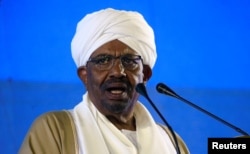Sudan's crackdown on anti-government protesters could jeopardize efforts to normalize relations with the United States, some key U.S. observers say.
Since protests erupted Dec. 19 over high inflation and rising bread and fuel prices, rights groups and news sources, including VOA, have issued reports of arbitrary arrests, detentions and killings.
Protests continued Thursday as hundreds of people took to the streets of Khartoum demanding the release of detained activists and that long-time President Omar al-Bashir step down. He refuses to do so.
The Reuters news agency, however, reported that Bashir has taken a more conciliatory tone toward protesters in recent days, saying they are mostly young with poor prospects, while promising to free jailed journalists.
Sudan has sought to be removed from a list of countries that the United States has designated as state sponsors of terrorism. One U.S. lawmaker said that given the current circumstances, is not likely to happen at this time.
"We were on a trajectory of re-establishing relations, getting rid of sanctions, getting rid of the 'state sponsor of terrorism' designation," said U.S. Congresswoman Karen Bass of California, a top Democrat on the House Foreign Affairs Subcommittee on Africa. "And obviously, if the government is not going to respond peacefully, then that trajectory is probably not going to move forward."
The U.S. State Department last month called on Sudan's government to restrain its security forces from the use of excessive force, including live fire and tear gas.
In November, the U.S. welcomed Sudan's commitment to improve human rights protections and practices, including freedom of the press. But the government's response to protesters, including the "use of violence," could make it harder for Sudanese officials to convince Washington of any assurance to enhance human rights, observers say.
Efforts to normalize relations between Sudan and the U.S. began under the administration of U.S. President Barack Obama, which ended two decades of economic sanctions on the northeast African country.
Human rights issues
A U.S. official serving in the administration of current President Donald Trump said Sudan's actions now on human rights "are putting at risk" the chances for a successful conclusion of talks to improve bilateral relations.
In November, Sudan's foreign minister, El-Dardiri Mohamed Ahmed, told VOA the process of removing Sudan from the U.S. list of state sponsors of terrorism would start soon.
About one month after the interview, the protests in Sudan began and have since rocked the country.
The State Department did not respond to questions about the time frame of the process, and instead referred to a press statement released last month.
Suliman Baldo, a senior adviser at the Washington-based nonprofit Enough Project, says reports of torture, excessive use of force and use of live ammunition are all reasons the U.S. should immediately suspend normalization talks with Khartoum.
"What do the U.S. government and governments of the Troika [U.S., Britain and Norway] and Canada need as more proof of the government of Sudan's departure from its commitment toward the improvement of its human rights record?" Baldo asked.
At least 45 people have died during the protests, according to Amnesty International. The government said that number is closer to 30. Baldo said normalization of relations with Sudan should "only occur as part of a path that strengthens a transition to democracy."
'Legitimate' demands
Sudan's prime minister, Moataz Moussa, told Reuters this week that demands for better living conditions are "legitimate" and that his government is trying to turn the country's deteriorating economy around.
An overhaul of the economy, however, will take more than verbal promises, according to Baldo, who blames the economic issues on longstanding mismanagement, including "curbing the huge percentage of the national budget that goes to the security and defense sector [and] fighting corruption credibly by having an independent anticorruption that has prosecutorial powers."
"Sudan has to take a lot of measures to show seriousness about really addressing the collapse of the economy," he said.






